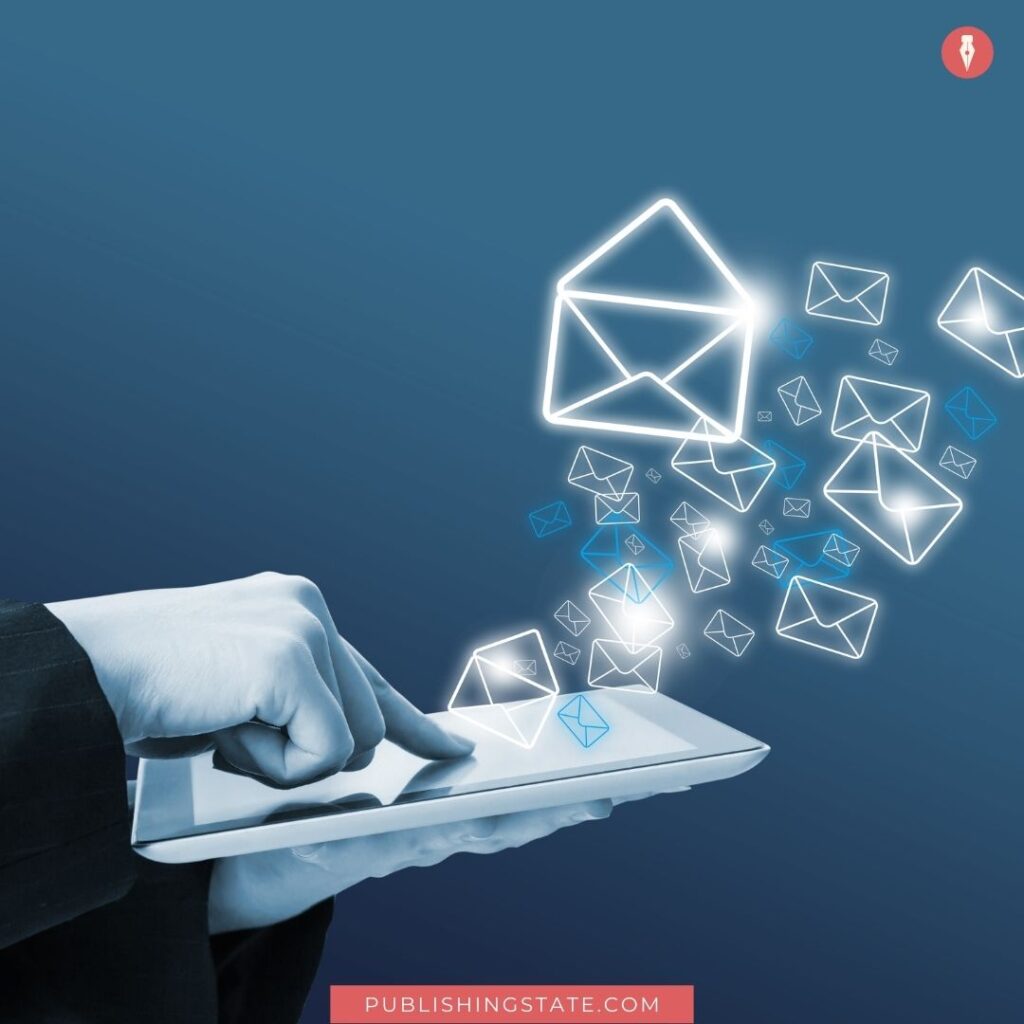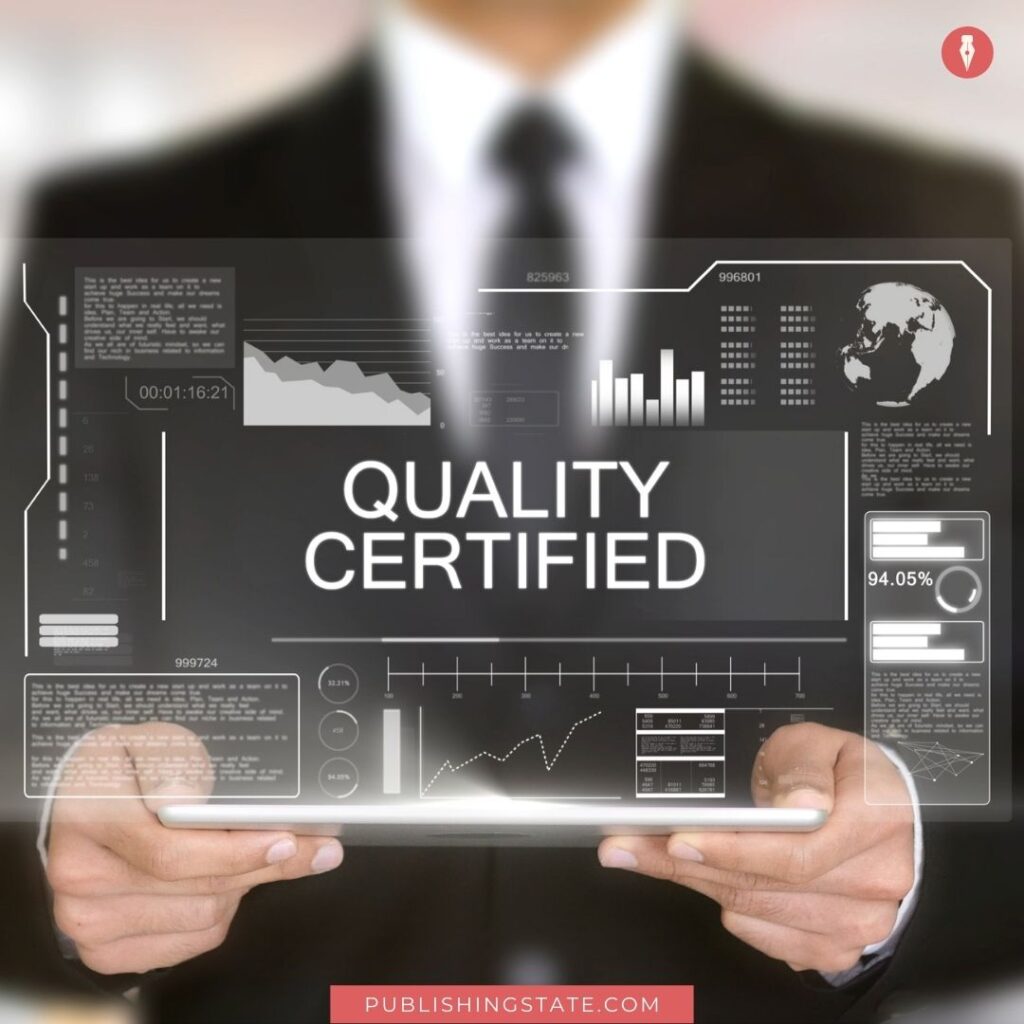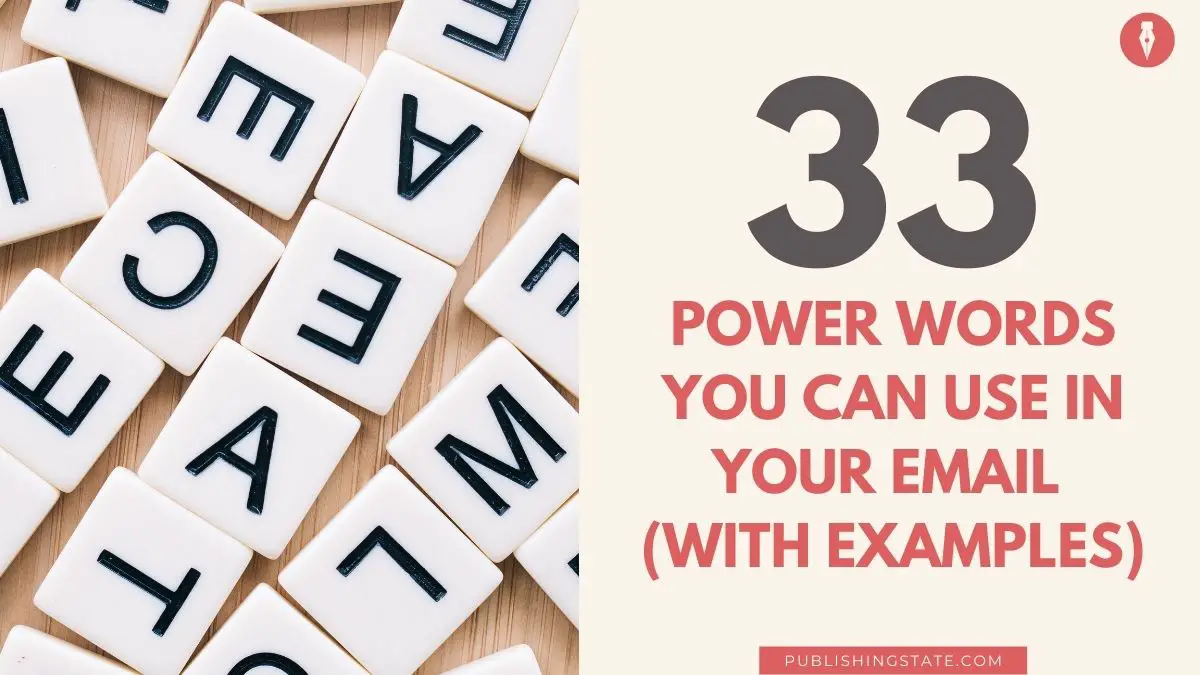Table of Contents
- Why would you use power words in your email?
- 1. Optimistic
- 2. Exceptional
- 3. Emphasize
- 4. Projected
- 5. Quadruple
- 6. Incentive
- 7. Cost-efficient
- 8. Incredibly
- 9. Thought-provoking
- 10. Manifestation
- 11. Engaging
- 12. Stimulate
- 13. Inculcate
- 14. Evoke
- 15. Tangible
- 16. Augment
- 17. Amplify
- 18. Awe-inspiring
- 19. Formulate
- 20. Turbo-charge
- 21. Attribute
- 22. Certified
- 23. Volatile
- 24. Sustainability
- 25. Compliance
- 26. Proven
- 27. Miraculous
- 28. Sensational
- 29. Eye-opening
- 30. Captivating
- 31. Breakthrough
- 32. Milestone
- 33. Amazing
- Concluding remark
In this post, I will discuss some of the power words you can use in your email. To be exact, 33 power words.
The words are applicable to be used whether you are writing work or business-related emails.
In addition to these words, I also include original examples of how these words can be used when you compose your email.
Why would you use power words in your email?
In the first place, why would anyone need to consider using power words in their email?
Why are they important?
Email is often the first point of contact for a business; email writing can make or break your company’s image. A professional email reflects a professional person.
However long your email is, your writing reflects what you think.

The better you write, the better your message resonates with the reader. They know they are dealing with no ordinary person.
Using good words in your email content can captivate the readers and move them to execute your call to action!
The rich vocabulary also indicates that you take your job seriously. You can offer an intriguing partnership or working relationship with your email recipient.
The following power word list can be lengthy, and going through everything at once may take up to 7 minutes.
Therefore, to help you navigate the content better, please use the table of contents to jump to the specific word you are interested in to learn further. I do hope these words will have some impact on you.
So, without further ado, here are the 33 power words you can use in your email:
1. Optimistic
Being optimistic means expressing confidence in the future or the future event. We are looking at things with a bright outlook.
You trust that things will turn out in favor of your situation and bring positive results.
Examples:
- Optimistically, barring unforeseen circumstances, this project will break even in eight months. Please find my breakdown analysis in the PowerPoint attachment in this email.
- The speed and the progress of the new building construction offer an optimistic outlook of where the company is heading.
- During our discussion last week, the data you presented to our team offered a glimpse of optimism, despite the challenge we face during this difficult pandemic.
2. Exceptional
Exceptional refers to something extraordinary. Something beyond expectation.
Normally, you use the power word exceptional to describe a supreme quality (or potential quality) of a certain product, service, or person (perhaps a team too).
A few examples you can use in your email:
- During the Tech-Con Exhibition last week, I saw the latest productivity product, TechMail 21. Based on my observation, TechMail 21 delivers exceptional performance at a cost-effective price.
To describe a person of interest using this power word, consider the following:
- Over the years, I have worked with many legal partners who come and go. Out of these many people, none matches the exceptional quality of Fletcher. He is truly outstanding.
3. Emphasize

When you stress something out, you emphasize. When you raise the importance of a matter, you emphasize.
For examples:
- Before I end this email, let me once again emphasize our commitment to investing in new infrastructure in downtown Seattle. We hope this commitment will result in a further improvement in the quality of life of Americans in general.
- The software exhibits all the characteristics of a winning app. But what can be emphasized most here is the level of security it offers. It is unbeatable even compared with its closest competitor.
4. Projected
The power word projected is best used with someone analytical or statistically centered.
If you are dealing with a Chief Financial Officer, VP of Marketing or an accountant, it is a good time to use it.
For examples:
- Based on my analysis, our e-commerce sales are projected to hit double-digit growth in less than six months, thanks to the integration with our existing marketplace platforms.
- Our company posted record-breaking profits in the second quarter, which was projected to continue rising up until the end of the year. We think the time is ripe for a partnership collaboration.
5. Quadruple
The word quadruple means multiplying something by four. Here, we are talking about growth. And we’re talking about massive progress.
Examples:
- Our growing team requires an additional five hundred desks soon. We are hoping we will be able to quadruple our current number within six months.
- In the last quarter, our turnover quadrupled from Q1. We expect this year to be our most outstanding growth yet.
6. Incentive
An incentive is a reward or a reason to do something. Among others, it’s a fantastic way to boost the team’s morale and motivation.
Examples:
- We are offering a one-time bonus for all the employees who performed exceptionally well in this task. The incentive will be announced once we complete the evaluation in three weeks.
- Seeing your email made me really happy. It is good to hear you are taking the initiative to learn new things. If you finish this project before Friday, I can offer an incentive.
7. Cost-efficient
You can use the term cost-efficient to describe a project or a feature of this project.
Going deeper, you can promote an outcome of a certain undertaking. It can also use to justify the financial investment.
Examples:
- Using ProTask requires a monthly subscription. However, compared with the current enterprise plan with Cisco, ProTask is a much more cost-efficient platform that will save us US200K in two years.
- The new, cloud-based storage will provide you a cost-efficient archiving strategy. You only pay what you use, and the bill will only increase if your usage increases.
8. Incredibly
Use the word incredibly to describe the superiority of a product or service. It tells the reader that the offering will be difficult to resist and may not be available elsewhere.
Examples:
- What is most compelling about this device is that it is incredibly easy to use. Because it is so intuitive, a user does not even have a user manual to use it.
- The latest Ali Baba offering is being grabbed incredibly fast. We should not wait before it’s too late.
9. Thought-provoking

The word thought-provoking refers to the revealing, intelligent or informative situation. It makes an observation original.
Readers cannot help but feel enlightened seeing this word, especially if you are describing the recipient.
For examples:
- I am glad I attended your town hall session last Tuesday. Some of the plans you outlined for the company are ambitious, and some of your thought-provoking questions make me think hard about the company’s future.
- I have looked at the prototype you sent me last week. The device is thought-provoking and intriguing. But my question here is that, will the investment justify the ROI?
10. Manifestation
Manifestation is the outcome as a result of an effort. It’s what you gain after putting in the input.
Examples:
- The growth you are seeing for the past six months is a manifestation of hard work, determination and unity among our team members. Excellent work!
- Suppose there is one sentence to describe this award by the National Film Foundation. In that case, it is a manifestation of our passion and hunger to feed the community with different levels of creativity.
11. Engaging
To engage means to become involve or to attract something (or someone).
For an example:
- What set your presentation apart was how engaging you got our prospective clients interested in the product offering. We need you to give the same show-stopping performance next week!
- We need to continue producing content daily and content that is engaging and provides high value to our readers so that they will come back for more.
12. Stimulate
We use the power word stimulate in the email to refer to something that encourages a certain action or result.
For instances:
- One way to stimulate our e-book readers into a more active mode is to embed more interactive content. These interactive contents include audio, videos, quizzes and augmented reality (AR) elements.
- To stimulate revenue growth, let us consider adding low-margin products that are affordable to our low-end market. While the profit margin is lower, we can play with product volumes and expand the market base.
13. Inculcate
Similar to stimulate, we can also use the word inculcate in the email content when we want our people to take action or change a habit.
For examples:
- From now on, we need to inculcate a culture of openness and honesty. These are some areas we’ve been found wanting, and we need to begin turning things around.
- Inculcating new team members with our fast work speed will not be easy if it is not done when they come onboard. Let’s arrange a short discussion with the HR department on implementing this with the new hires.
14. Evoke
To evoke means to draw out a response or emotion from someone. It can also refer to the cause of something.
For examples:
- Your email evoked such a positive reaction from the team members that we didn’t even feel it necessary to call you for an extensive feedback session at this point.
- Your email evoked a lot of curiosity among the readers. We will email them again soon for more information on your book launch.
15. Tangible

Use this word in your email when you want to highlight something as objective and realistic as compared to intangible concepts such as feelings, thoughts or memories.
For examples:
- We need to get more tangible feedback from our team members. The email you sent out last week was not totally clear about what we are looking for, and I did receive mixed responses.
- Other than increased revenues, we observe another tangible benefit after making these changes is the marked improvement in office tidiness.
16. Augment
Augment means to increase or expand, so you might find it used when discussing growth.
For examples:
- It is time for us to augment our email marketing campaigns with email automation. It will allow us to reach out to more customers while at the same time saving up on human resources needed for reaching every new subscriber manually.
- Now that we have seen the positive effect on this small focus group, it is time to augment the project to include our real customers. What do you think of this idea?
17. Amplify
When you amplify, you make something more intense. It can also be used as a verb to describe the act of making it stronger or bigger. Something more impactful.
For examples:
- We need to amplify our email marketing campaign by sending out email blasts daily starting on Monday. Our email readers love to hear from us, and we will use this opportunity to connect closely with them.
- Our last Facebook advertising campaigns seem to work well with the new targeted audience. How do we amplify the reach to a bigger audience and to different segments?
18. Awe-inspiring
This is one of those words you can use to convey your true feelings about something or someone.
For example:
- Your email was so awe-inspiring that the entire team is now working on implementing all your suggestions.
- I am sorry I could not attend your briefing during our last quarterly performance review. But the lads told me that your session was the most awe-inspiring!
19. Formulate
This word means to plan out, to come up with an idea or even a theory. It would be used in the context of business when you need to find solutions for problems.
For examples:
- We should formulate email marketing campaign strategies that will engage email readers, make them buy our products or services, and recommend our products to their network.
- After going through some challenging periods last year, we need to formulate ways to remain resilient this year as things look to be turning even tougher.
20. Turbo-charge
To turbo-charge something means to speed it up and bring things to a new level.
For instances:
- Based on the latest M1 chip performance, acquiring a couple of the iMacs will turbo-charge the team’s productivity, no doubt. Are you of the same opinion?
- In my opinion, if we want to turbo-charge our email marketing campaigns, sticking to the current free plan will not just cut it. I believe it is time to upgrade to the premium plan.
21. Attribute
This is one of those words usually used when you want to suggest the reason behind something. Use this word in your email, and the recipient will read it differently.
For examples:
- One of the distinguished attributes of this property is its unique payment plan that will allow the ownership to be transferred after 5 years of the continuous lease.
- For the past 18 months, our revenue growth is much attributed to our COO’s determination to break into our competitors’ market territories.
22. Certified

When something is certified, it means that it has passed the required tests or evaluation. We are talking about technical clearance, a crucial part of product development.
For examples:
- This app has passed all the necessary Apple certification, and the payment security gateway has been certified by Play Protect. We are good to go for launch.
- Before proceeding to the next level, could you confirm that your medical product line-up is certified by the authority and attach the necessary certifications in your next email reply?
23. Volatile
This word is used to describe something that moves rapidly or fluctuates quickly. Sometimes, the term refers to a situation that may present risks.
For examples:
- The market underwent a volatile day as the latest jobs data hit traders’ desks. We have to be even more vigilant tomorrow.
- The internet analytics industry usually goes through periods of volatility, but once automation becomes widely adopted, the industry will become more mainstream.
24. Sustainability
This word carries the same meaning as maintaining or supporting something.
Sustainability could also describe the capability of continuing for an extended period without a decline in performance or production.
For examples:
- Sustainability is not just about recycling and cutting down on non-essential spending; it also ensures we conduct our practice ethically and with integrity.
- In the past few years, the university’s budgets have continued to be reduced, and we need to look into ways that help the institution’s financial sustainability.
25. Compliance
Compliance refers to something that follows or adhere to the standards, rules or regulations.
For instances:
- We are in total compliance with all state and federal guidelines for email marketing campaigns. We are more than ready to move things to the next level now.
- Could you please ensure that the team would submit a proposal that is in full compliance with the requirements set by the client and within the deadline, too?
26. Proven
When something is proven, it means that there is evidence that it works.
For examples:
- The email marketing campaign strategy we had implemented last year has a 90% open email rate and a 5% click-through rate. These have proven to be very impressive figures.
- Our counterpart’s demo presentation last week was quite impressive. But in my opinion, the team leader did not clarify if the go-to-market strategy has been proven working. Do you agree?
27. Miraculous
Miraculous is an interesting power word to use. The term is used to describe something extraordinary.
For examples:
- Our honey harvesting business began with the miraculous story of my youngest son recovering from a rare disease from consistent, pure honey intake.
- The pandemic has made things really tough for our business. It will take a miraculous level of energy and effort for all of us to pull through. But I believe we have what it takes.
28. Sensational
Sensational is a word that is usually associated with news.
Sensational can also mean something that causes a lot of excitement or attention. Use the term in your next email to your co-worker or superior for great effect.
For example:
- I am glad you introduced the team to the AI writing assistant. Today we are producing content at sensational speed. I am myself still finding it hard to believe at our current productivity level.
- Look, US News and World Report describe our recent purchase of Cucumber Tech Inc. as sensational. Have a look at the screenshot attached.
29. Eye-opening

Eye-opening is a powerful word that makes you realize something you have previously not known or have just come to understand.
Perhaps you want to email your colleague about her short speech during her surprise birthday party at the office.
For example:
- Hey Claudia, great to see you working on your next project. Your speech last week about how we should continue finding fulfillment, one project at a time, was really eye-opening.
30. Captivating
Captivating is one of the power words that means something that captures your attention.
For examples:
- Your presentation to our customer yesterday was captivating. I was thinking of arranging a session where you can teach the junior team the art of public speaking. What say you?
- I hope everyone will have a good weekend resting to week. And if you are looking for something to read, can I recommend reading The Content Trap by Bharat Anand? It is a captivating book, and you will just love it!
31. Breakthrough
Breakthrough is an email writing power word that means something that happens when someone or something makes a big advance through effort or determination.
For examples:
- Online influencers are emerging as the new public relations arm for many brands due to bringing about breakthrough product awareness and sales.
- Our e-books have been growing steadily for the past two years, but we are still to find any significant breakthrough with audiobook titles? Anybody has any idea how we strategize things next?
32. Milestone
Milestone is a term that refers to an important event or point in time, usually the completion of a long-term goal.
For examples:
- Last month, we reached a significant business milestone when our new hotel booking app was featured on TechCrunch Top 100! Congrats to the whole team for this wonderful achievement!
- Our long-term goal is to beat Nike as the go-to sports brand in 5 years. To achieve this major goal, we need to sit down and think of smaller milestones we want to achieve in the next 1 to 2 years.
33. Amazing
Another fantastic power word you can use in your email, amazing, means something that impresses you very much. Something out of this world.
For examples:
- I received an email from your colleague today on the new hire, and I am amazed at how positive she felt about Jacob’s hiring. You must have done such a wonderful job during his interview process to make her feel like this!
- It is amazing to see a mechanical engineer who is technically superb at his job and can speak with supreme confidence. You are a rare asset to this company.
Concluding remark
I hope you are quite happy with this list of 33 power words you can use in your email and can use the examples I have written in your next email.
The reality is that there are plenty more fabulous power words out there you can find and use in your email.
But if these words sound too intimidating to you, don’t rush using them. Take things slowly.
Use one word at a time. And make yourself comfortable with these power words before making them part of your daily email vocab.
Do you have suggestions on other power words we can use to boost our email professionalism? Perhaps you have your own favorite words that you use frequently?
Do drop your suggestion(s) in the comment box below. I would love to hear from you.

2 thoughts on “33 Power Words You Can Use in Your Email (with Examples)”